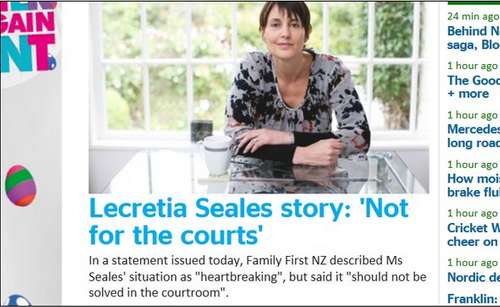Lawyer with brain cancer in legal bid for right to die
 NZ Herald 21 March 2015
NZ Herald 21 March 2015
A terminally ill woman is mounting a legal challenge seeking the right for a doctor to help her die without criminal prosecution.
Lecretia Seales, 41, is dying from brain cancer and believes it’s a “fundamental human right” to be able to choose to end her life with medical assistance, if she wants to, before her suffering becomes intolerable.
In a legal first in New Zealand, the senior legal and policy adviser at the Law Commission has filed a statement of claim in the High Court seeking a ruling to determine whether her GP could lawfully administer a lethal dose of drugs.
Assisting suicide is a crime punishable by up to 14 years in prison but Ms Seales’ case relies on the provisions in the New Zealand Bill of Rights Act which protect the rights to not be deprived of life or subjected to cruel treatment.
If successful, the bid would allow the doctor to euthanise Ms Seales because of her specific circumstances and would not set a precedent. But a favourable High Court ruling would allow others to follow suit and potentially send a signal to Parliament for further law reform.
Diagnosed in 2011 with an aggressive brain tumour, Ms Seales has suffered gradual paralysis, which has robbed her of the ability to move her hand, arm, leg and eyesight on the left side of her body.
She’s not afraid of death, but of losing her remaining physical and mental abilities. Even if the case is successful, Ms Seales is uncertain about ending her life with medical assistance.
But I want the right to choose. That would give me comfort if I knew that [option] was there. I don’t know whether I necessarily would because I’m certainly not suffering intolerably now,” she told the Weekend Herald.
In a statement issued today, Family First NZ described Ms Seales’ situation as “heartbreaking”, but said it “should not be solved in the courtroom or a change in law but through the guarantee of the best palliative care”.
“Patients facing death have a fundamental human right to receive the very best palliative care, love and support that we can give to alleviate ‘intolerable suffering’ that they fear,” Bob McCoskrie, national director of Family First NZ, said.
“This is real death with dignity – surrounded and supported by loved ones, rather than a right to try and preempt the ‘uncertainty’ and timing of the end. Suicide is not the answer.”
The organisation had “massive empathy” for Ms Seale, but said if her legal challenge was successful, “it would be the thin edge of the wedge” and a “slippery slope”.
“However well-intentioned, the old adage that. ‘hard cases make bad law’, comes into play,” Mr McCoskrie said.
“To allow assisted suicide would place large numbers of vulnerable people at risk – in particular those who are depressed, elderly, sick, disabled, those experiencing chronic illness, limited access to good medical care, and those who feel themselves to be under emotional or financial pressure to request early death.”
Euthanasia-Free New Zealand also issued a statement to media saying a change to New Zealand law on assisted suicide and euthanasia was “not in society’s best interests”.
While Ms Seales’ case was intended for her individual circumstances, it would “in the long run adversely affect the rights of many others in our society”, Professor David Richmond, spokesman for the organisation, said.
“Ms Seales’ request is superficially a simple one based on personal choice and autonomy. Unfortunately the issues are far more complex for society than that,” he said.”Current laws were drawn up to guarantee citizens the right to life.
If Ms Seales’ actions were to lead eventually to the decriminalization of euthanasia and assisted suicide, as she apparently hopes they will, citizens will be guaranteed the right to state-sanctioned death – presumably at the hands of doctors.”
http://www.nzherald.co.nz/nz/news/article.cfm?c_id=1&objectid=11420767






